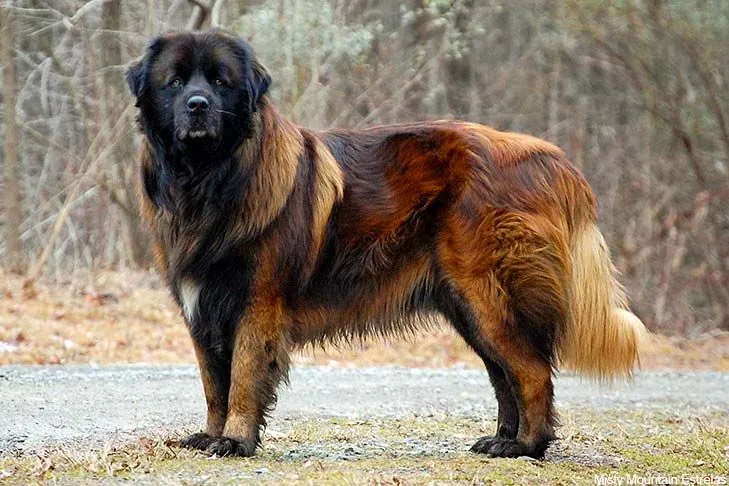Are you ready to meet your new best friend? Say hello to the Golden Mountain Dog, a lovable hybrid that’s stealing hearts across the USA. This gentle giant combines the best traits of the Golden Retriever and Bernese Mountain Dog, creating a versatile canine companion that’s perfect for families, outdoor enthusiasts, and anyone looking for a furry friend with a heart of gold.
I. Meet the Golden Mountain Dog: A Lovable Hybrid
What’s in a name? Unraveling the breed’s origins
The Golden Mountain Dog isn’t just a catchy name it’s a perfect description of this mixed breed’s parentage. Born from the union of a Golden Retriever and a Bernese Mountain Dog, these pups inherit a unique blend of characteristics that make them stand out in the world of designer dogs.
Golden Retrievers, known for their friendly demeanor and intelligence, have long been America’s sweetheart. On the other hand, Bernese Mountain Dogs bring their calm and steady nature to the mix, along with their striking good looks. When these two breeds come together, magic happens.
Bernese Mountain Dog + Golden Retriever = Match made in heaven
Imagine combining the Golden Retriever’s boundless enthusiasm with the Bernese Mountain Dog’s gentle giant persona. The result? A dog that’s as happy lounging on the couch as it is hiking through the mountains. This mixed breed offers the best of both worlds:
- Friendly disposition: Golden Mountain Dogs inherit the social butterfly genes from both parents.
- Intelligence: With two smart breeds in their lineage, these pups are quick learners.
- Moderate energy levels: They’re active enough for outdoor adventures but calm enough for apartment living.
- Striking appearance: Picture a fluffy teddy bear come to life, and you’re not far off!
Why Americans are falling head over heels for this gentle giant
It’s no surprise that Golden Mountain Dogs are gaining popularity across the United States. Their affectionate nature makes them ideal family pets, while their trainability appeals to first-time dog owners and experienced handlers alike.
“My Golden Mountain Dog, Max, is like having a living, breathing teddy bear around the house. He’s got the energy to play with the kids but knows when it’s time to chill. I couldn’t ask for a better family dog!” Sarah, proud Golden Mountain Dog owner from Colorado
II. The Golden Mountain Dog’s Striking Appearance
Size matters: How big do these pups get?
When it comes to Golden Mountain Dogs, “go big or go home” is the name of the game. These pups are definitely on the larger side, thanks to their Bernese Mountain Dog parentage. Here’s a quick rundown of what you can expect:
| Gender | Height Range | Weight Range |
|---|---|---|
| Male | 24-28 inches | 75-120 lbs |
| Female | 22-26 inches | 70-100 lbs |
Remember, these are just averages. Some Golden Mountain Dogs might be smaller or larger depending on which parent they take after more.
Coat of many colors: Exploring their unique fur patterns
One of the most charming aspects of the Golden Mountain Dog is their varied coat colors. Thanks to their mixed heritage, you’ll find a rainbow of options:
- Golden with white markings
- Black with tan points
- Tricolor (black, tan, and white)
- Reddish brown with white
Their coats are typically long and thick, with a soft, fluffy undercoat that’ll make you want to cuddle them all day long. Be prepared for some serious shedding, though – these pups don’t skimp on the fur!
Those puppy-dog eyes: Facial features that’ll melt your heart
If you thought Golden Retrievers had expressive eyes, wait until you meet a Golden Mountain Dog. These pups often inherit the soulful, brown eyes of both parent breeds, coupled with floppy ears that give them an eternally youthful appearance.
Their faces tend to be a bit broader than a Golden Retriever’s, thanks to the Bernese influence, with a strong, square muzzle that’s perfect for giving sloppy kisses.
III. Personality Plus: What to Expect from Your Golden Mountain Dog
Gentle giants: Their calm and patient nature
Don’t let their size fool you Golden Mountain Dogs are the definition of “gentle giant.” They inherit the Bernese Mountain Dog’s calm and steady nature, making them excellent companions for families with children or seniors.
These dogs are known for their patience, often tolerating the antics of young kids with a wagging tail and a doggy smile. However, it’s important to teach children how to interact respectfully with dogs, regardless of how patient they may be.
Family-friendly furballs: How they interact with kids and other pets
Golden Mountain Dogs are natural born family members. They typically get along well with children of all ages, other dogs, and even cats if introduced properly. Their playful nature makes them great playmates, while their protective instincts ensure they’ll always keep an eye out for their human pack.
Tips for introducing your Golden Mountain Dog to other pets:
- Start with supervised interactions
- Use positive reinforcement
- Give each pet their own space
- Never force interactions
- Be patient – sometimes it takes time for pets to adjust to each other
Smart cookies: Their intelligence and trainability
With two highly intelligent breeds in their lineage, it’s no surprise that Golden Mountain Dogs are quick learners. They excel in obedience training and often pick up new commands with ease. This intelligence, combined with their eagerness to please, makes them highly trainable.
However, their smarts also mean they need mental stimulation to stay happy and healthy. Puzzle toys, training sessions, and interactive games are all great ways to keep your Golden Mountain Dog’s mind sharp.
IV. Living with a Golden Mountain Dog in the USA
Space invaders: Do they need a big yard?
While Golden Mountain Dogs can adapt to various living situations, they do best in homes with some outdoor space. A fenced yard where they can romp and play is ideal, but it’s not a deal breaker if you’re an apartment dweller.
The key is providing enough exercise and mental stimulation, regardless of your living situation. If you live in an apartment, be prepared for daily walks and trips to the dog park to keep your furry friend happy and healthy.
Climate considerations: Thriving in different American regions
Thanks to their thick double coats, Golden Mountain Dogs are well-equipped to handle colder climates. They’ll love frolicking in the snow if you live in states like Minnesota or Maine. However, they can also adapt to warmer regions with some extra care:
- In hot climates:
- Provide plenty of shade and fresh water
- Avoid exercise during the hottest parts of the day
- Consider a kiddie pool for cooling off
- Never leave them in a hot car
- In cold climates:
- They’ll likely love the weather, but still need protection in extreme cold
- Check paw pads for ice and snow buildup
- Consider a dog coat for very short haired individuals
Exercise needs: Keeping your Golden Mountain Dog happy and healthy
Golden Mountain Dogs have moderate energy levels, requiring regular exercise to stay fit and content. Aim for at least 60 minutes of activity per day, which can include:
- Walks or jogs
- Fetch sessions
- Swimming (if they take after their Golden Retriever parent)
- Hiking trails
- Agility courses
Remember, a tired dog is a good dog! Regular exercise not only keeps them physically fit but also helps prevent destructive behaviors that can arise from boredom.
V. Grooming Your Gentle Giant
Brush hour: Tackling that double coat
Get ready to become best friends with your brush! Golden Mountain Dogs have thick, double coats that require regular grooming to keep them looking their best. Here’s a grooming schedule to keep in mind:
- Daily: Quick brush to remove loose fur and prevent matting
- Weekly: Thorough brushing session, paying attention to areas prone to tangling
- Seasonally: Expect heavy shedding during spring and fall – increase brushing during these times
Investing in a good quality undercoat rake and slicker brush will make grooming sessions much easier for both you and your pup.
Splash zone: Bath time tips and tricks
While Golden Mountain Dogs don’t need frequent baths, they’ll certainly enjoy a good splash now and then. Here are some bathing tips:
- Use lukewarm water and dog specific shampoo
- Thoroughly wet the coat before applying shampoo
- Massage the shampoo into the coat, paying attention to dirty areas
- Rinse completely – leftover shampoo can irritate the skin
- Towel dry and let them shake off excess water
- Use a blow dryer on low heat if necessary, especially in colder months
The finishing touches: Nail care, ear cleaning, and more
Don’t forget these important grooming tasks:
- Nail trimming: Every 2-4 weeks, or when you hear them clicking on the floor
- Ear cleaning: Check weekly, clean as needed with a gentle ear cleaner
- Teeth brushing: Aim for daily brushing to prevent dental issues
- Eye wiping: Clean around the eyes with a damp cloth to prevent tear stains
Regular grooming sessions are not just about keeping your Golden Mountain Dog looking their best they’re also a great opportunity to bond with your furry friend and check for any unusual lumps, bumps, or skin issues.
VI. Health Matters: Keeping Your Golden Mountain Dog in Tip-Top Shape
Common health concerns to watch out for
While mixed breed dogs often benefit from hybrid vigor, Golden Mountain Dogs can still be prone to certain health issues inherited from their parent breeds. Here are some conditions to be aware of:
- Hip and elbow dysplasia: Common in large breeds, regular exercise and maintaining a healthy weight can help prevent these joint issues.
- Bloat: A serious condition where the stomach fills with gas and twists. Feed smaller meals and avoid exercise immediately after eating.
- Cancer: Unfortunately, both Golden Retrievers and Bernese Mountain Dogs have higher-than-average cancer rates. Regular check-ups can help with early detection.
- Eye problems: Including progressive retinal atrophy and cataracts.
- Heart issues: Such as subvalvular aortic stenosis.
It’s important to note that not all Golden Mountain Dogs will develop these conditions. Regular vet check ups and a healthy lifestyle can go a long way in preventing or managing health issues.
Nutrition needs: Fueling your furry friend
Proper nutrition is key to keeping your Golden Mountain Dog healthy and happy. These large dogs require a diet that supports their size and energy levels:
- High-quality protein: Look for foods with real meat as the first ingredient
- Healthy fats: For coat health and energy
- Complex carbohydrates: For sustained energy
- Vitamins and minerals: For overall health and immune support
Consider feeding a large breed specific formula, especially during the puppy stage, to support proper growth and joint health. Always consult with your veterinarian to determine the best diet for your individual dog.
Vet visits: Establishing a care routine
Regular veterinary care is crucial for maintaining your Golden Mountain Dog’s health. Here’s a general schedule to follow:
- Puppies: Monthly visits for vaccinations and check ups until 16 weeks old
- Adults: Annual wellness exams, or twice yearly for seniors
- Vaccinations: Keep core vaccines up to date
- Parasite prevention: Monthly heartworm, flea, and tick prevention
Remember, prevention is always better (and often cheaper) than cure. Stay on top of your pup’s healthcare to ensure a long, happy life together.
VII. Training Your Golden Mountain Dog: From Puppy to Perfect Companion
Starting off on the right paw: Early socialization tips
Socialization is crucial for raising a well-adjusted Golden Mountain Dog. These pups are naturally friendly, but early exposure to various people, animals, and environments will help them grow into confident adults.
Socialization checklist:
- Introduce to different people (ages, genders, races)
- Expose to various animals (dogs, cats, livestock)
- Visit different environments (parks, urban areas, countryside)
- Experience different sounds (traffic, appliances, music)
- Practice handling (paw touching, ear cleaning, grooming)
Start socialization as early as possible, but always ensure interactions are positive and not overwhelming for your puppy.
Basic obedience: Commands every Golden Mountain Dog should know
Thanks to their intelligence and eagerness to please, Golden Mountain Dogs typically excel in obedience training. Here are some essential commands to teach:
- Sit
- Stay
- Come
- Down
- Leave it
- Drop it
- Heel
Use positive reinforcement techniques like treats and praise to make training sessions fun and rewarding. Keep sessions short (5-10 minutes) but frequent for best results.
Advanced tricks: Showing off your pup’s smarts
Once your Golden Mountain Dog has mastered the basics, why not teach them some impressive tricks? Here are some ideas:
- Play dead: A classic crowd-pleaser
- Fetch specific items: Great for showing off their intelligence
- Balance treat on nose: Demonstrates patience and control
- Speak/Quiet: Useful for controlling barking
- Spin/Twirl: A cute trick that also provides exercise
Remember, training should always be a positive experience for both you and your dog. If either of you gets frustrated, take a break and try again later.
VIII. Finding Your Golden Mountain Dog in the USA
Adoption vs. breeders: Weighing your options
When it comes to bringing a Golden Mountain Dog into your life, you have two main options: adoption or purchasing from a reputable breeder. Both have their pros and cons:
Adoption:
- Pros:
- Give a home to a dog in need
- Often less expensive
- May come already trained and socialized
- Cons:
- May not know the dog’s full history
- Specific age or coat color may be harder to find
Reputable Breeder:
- Pros:
- Know the puppy’s history and parentage
- Can meet the parents and assess temperament
- Often comes with health guarantees
- Cons:
- More expensive
- May have to wait for a litter
- Requires thorough research to ensure ethical breeding practices
Whichever route you choose, make sure you’re ready for the long-term commitment of dog ownership.
Red flags to watch for when searching for a puppy
Whether adopting or buying from a breeder, be on the lookout for these warning signs:
- Reluctance to show you the living conditions
- Unwillingness to provide health clearances for parents
- Pressure to buy without asking questions
- Multiple litters available at once
- Puppies always available (ethical breeders often have waiting lists)
- Offering to ship puppies without meeting you
- Lack of knowledge about the breed or parent dogs
Always trust your instincts. If something feels off, it probably is.
Preparing your home for your new furry family member
Before bringing your Golden Mountain Dog home, make sure you’re prepared:
- Puppy-proof your space: Remove hazards, secure trash cans, and hide electrical cords
- Stock up on supplies: Food, bowls, collar, leash, bed, toys, and grooming tools
- Set up a safe space: Create a designated area for your pup with their bed and crate
- Plan the schedule: Decide on feeding times, potty breaks, and who’s responsible for what
- Find a vet: Research and choose a veterinarian before you need one
- Enroll in training: Look into puppy classes or basic obedience courses
Remember, bringing a new dog home is a big adjustment for everyone. Patience and consistency are key in these early days.
IX. Golden Mountain Dogs in American Pop Culture
Famous furry faces: Notable Golden Mountain Dogs
While Golden Mountain Dogs are still a relatively new mixed breed, they’re quickly gaining popularity. Some notable pups include:
- Bear: A therapy dog in Colorado who visits hospitals and nursing homes
- Maple: An Instagram-famous Golden Mountain Dog known for her hiking adventures
- Zeus: A search and rescue dog trained to find lost hikers in national parks
These dogs are ambassadors for their breed, showcasing the Golden Mountain Dog’s versatility and loving nature.
Conclusion
The Golden Mountain Dog is a large breed uniquely adapted to mountainous environments. Bred for thousands of years by Tibetan monks, they have an innate ability to withstand high altitudes and colds. Possessing great strength, loyalty and gentleness, they served as guardians of monasteries and companions to herders. Though endangered today due to habitat loss, efforts are underway to preserve this historic breed that legacy connects to the highest peaks of the Himalayas.
FAQs
Q:What is a golden mountain dog?
A: A delightful crossbreed between a Golden Retriever and a Bernese Mountain Dog.
Q:Are mountain dogs friendly?
A:Fairly friendly toward strange dogs.
Q:What do golden dogs eat?
A: Beef, chicken, turkey, lamb, duck, eggs, and fish.










